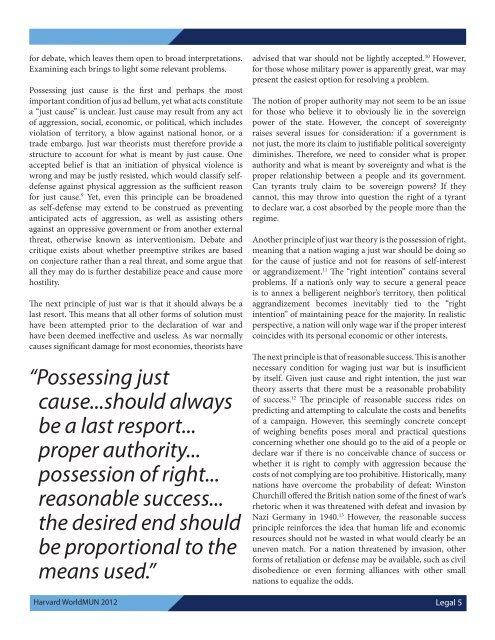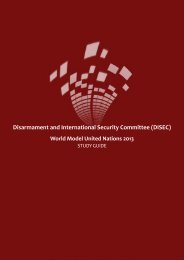Legal Committee - World Model United Nations
Legal Committee - World Model United Nations
Legal Committee - World Model United Nations
Create successful ePaper yourself
Turn your PDF publications into a flip-book with our unique Google optimized e-Paper software.
for debate, which leaves them open to broad interpretations.<br />
Examining each brings to light some relevant problems.<br />
Possessing just cause is the first and perhaps the most<br />
important condition of jus ad bellum, yet what acts constitute<br />
a “just cause” is unclear. Just cause may result from any act<br />
of aggression, social, economic, or political, which includes<br />
violation of territory, a blow against national honor, or a<br />
trade embargo. Just war theorists must therefore provide a<br />
structure to account for what is meant by just cause. One<br />
accepted belief is that an initiation of physical violence is<br />
wrong and may be justly resisted, which would classify selfdefense<br />
against physical aggression as the sufficient reason<br />
for just cause. 9 Yet, even this principle can be broadened<br />
as self-defense may extend to be construed as preventing<br />
anticipated acts of aggression, as well as assisting others<br />
against an oppressive government or from another external<br />
threat, otherwise known as interventionism. Debate and<br />
critique exists about whether preemptive strikes are based<br />
on conjecture rather than a real threat, and some argue that<br />
all they may do is further destabilize peace and cause more<br />
hostility.<br />
The next principle of just war is that it should always be a<br />
last resort. This means that all other forms of solution must<br />
have been attempted prior to the declaration of war and<br />
have been deemed ineffective and useless. As war normally<br />
causes significant damage for most economies, theorists have<br />
“Possessing just<br />
cause...should always<br />
be a last resport...<br />
proper authority...<br />
possession of right...<br />
reasonable success...<br />
the desired end should<br />
be proportional to the<br />
means used.”<br />
advised that war should not be lightly accepted. 10 However,<br />
for those whose military power is apparently great, war may<br />
present the easiest option for resolving a problem.<br />
The notion of proper authority may not seem to be an issue<br />
for those who believe it to obviously lie in the sovereign<br />
power of the state. However, the concept of sovereignty<br />
raises several issues for consideration: if a government is<br />
not just, the more its claim to justifiable political sovereignty<br />
diminishes. Therefore, we need to consider what is proper<br />
authority and what is meant by sovereignty and what is the<br />
proper relationship between a people and its government.<br />
Can tyrants truly claim to be sovereign powers? If they<br />
cannot, this may throw into question the right of a tyrant<br />
to declare war, a cost absorbed by the people more than the<br />
regime.<br />
Another principle of just war theory is the possession of right,<br />
meaning that a nation waging a just war should be doing so<br />
for the cause of justice and not for reasons of self-interest<br />
or aggrandizement. 11 The “right intention” contains several<br />
problems. If a nation’s only way to secure a general peace<br />
is to annex a belligerent neighbor’s territory, then political<br />
aggrandizement becomes inevitably tied to the “right<br />
intention” of maintaining peace for the majority. In realistic<br />
perspective, a nation will only wage war if the proper interest<br />
coincides with its personal economic or other interests.<br />
The next principle is that of reasonable success. This is another<br />
necessary condition for waging just war but is insufficient<br />
by itself. Given just cause and right intention, the just war<br />
theory asserts that there must be a reasonable probability<br />
of success. 12 The principle of reasonable success rides on<br />
predicting and attempting to calculate the costs and benefits<br />
of a campaign. However, this seemingly concrete concept<br />
of weighing benefits poses moral and practical questions<br />
concerning whether one should go to the aid of a people or<br />
declare war if there is no conceivable chance of success or<br />
whether it is right to comply with aggression because the<br />
costs of not complying are too prohibitive. Historically, many<br />
nations have overcome the probability of defeat: Winston<br />
Churchill offered the British nation some of the finest of war’s<br />
rhetoric when it was threatened with defeat and invasion by<br />
Nazi Germany in 1940. 13 However, the reasonable success<br />
principle reinforces the idea that human life and economic<br />
resources should not be wasted in what would clearly be an<br />
uneven match. For a nation threatened by invasion, other<br />
forms of retaliation or defense may be available, such as civil<br />
disobedience or even forming alliances with other small<br />
nations to equalize the odds.<br />
Harvard <strong>World</strong>MUN 2012 <strong>Legal</strong> 55

















